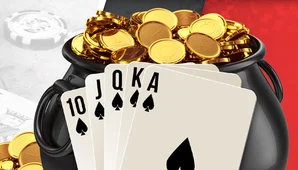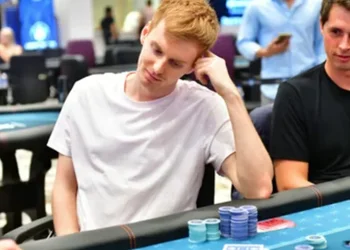Alexander Zubov is the Russian founder of the KOT poker fund, a player with online and offline MTT success, and occasional Twitch streamer. GipsyTeam got an interview with "AlexZA3" after he competed in Jeju, South Korea at the Triton Series on March 6th and 7th, 2024.
He took home an impressive prize of $278,000 for a 5th place finish. He was up against strong competition at the final table, including Mikita Badziakouski. In the end, his fell to the winner of the event, Roland Rokita with . Alexander may have lost the coinflip, but his inaugural Triton final table appearance was surely memorable (and profitable).
Top five finishers in Event #2 – $20k NLH 8-Handed:
- 1st – Roland Rokita, Austria – $904,000
- 2nd – Sirzat Hissou, Germany – $599,000
- 3rd – Kiat Lee, Malaysia – $439,000
- 4th – Mikita Badziakouski, Belarus – $355,000
- 5th – Alexander Zubov, Russia – $278,000
Natasha Ego1stka spoke to Alexander Kubov and we've translated their conversation. Enjoy.
Natasha – How many tournaments did you play in the Korean Triton series and how did you rank?
Alexander – I played all tournaments up to $50k, as the plan was to gain as much experience as possible. I flew in for a week and registered for 9 tournaments with an average buy-in of $26k. I started with $233k, won $303k, and had an ROI of 30%.
I started the series very well, reaching the final with an excellent stack in the second tournament, but failed to capitalize on my chance – I lost a huge flip ( vs ) that would have practically guaranteed a win.
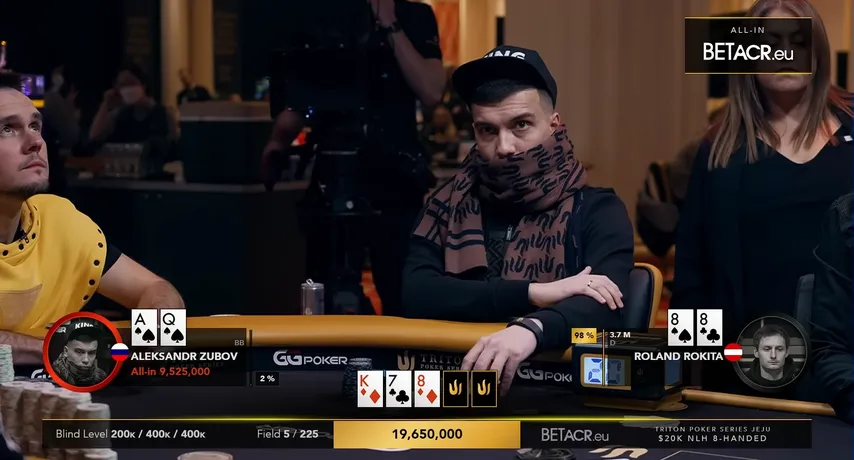
After the final, I congratulated Roland Rokita, who won that coin flip – he also confirmed that it essentially secured his victory in the tournament. It turned out to be a coin flip worth $500k; it's a pity that it ended up on the wrong side. But this is normal, and in any case, it was a good result for the first series.
(Editor's note – The clip of this hand starts at 7:40 in this YouTube video)
– Why didn't you stay for the Main Event?
– I planned to play all tournaments with buy-ins between $15-40k, but I hadn't decided on those over $50k yet. Without significant winnings and a large bankroll, even if you sell shares, you will still have to invest a substantial amount, about $15-20k, which is too much for one tournament. I am not ready for this yet. I would really like to play the Main Event – the structure is good, the field is excellent, and this time the ITM zone was nearly 20%, meaning getting into the money was quite possible. I hope that next time I will be able to test my strength.
Initially, I didn't go to Triton to earn millions; my main goal was to gain experience in high-stakes tournaments. I wanted to test my abilities – whether I could play with concentration, cope with the psychological pressure, and withstand such a tight pace. From the outside, it may seem easy and simple – you sit, play, and have fun all day. In reality, it is very difficult; there is a constant psychological struggle going on inside you, and you must emerge victorious. You need to learn to maintain composure, learn to detach yourself from the negative. The series is a serious test of mental and physical endurance. The purpose of the trip was to find out whether I was ready to play good poker in difficult, stressful situations.
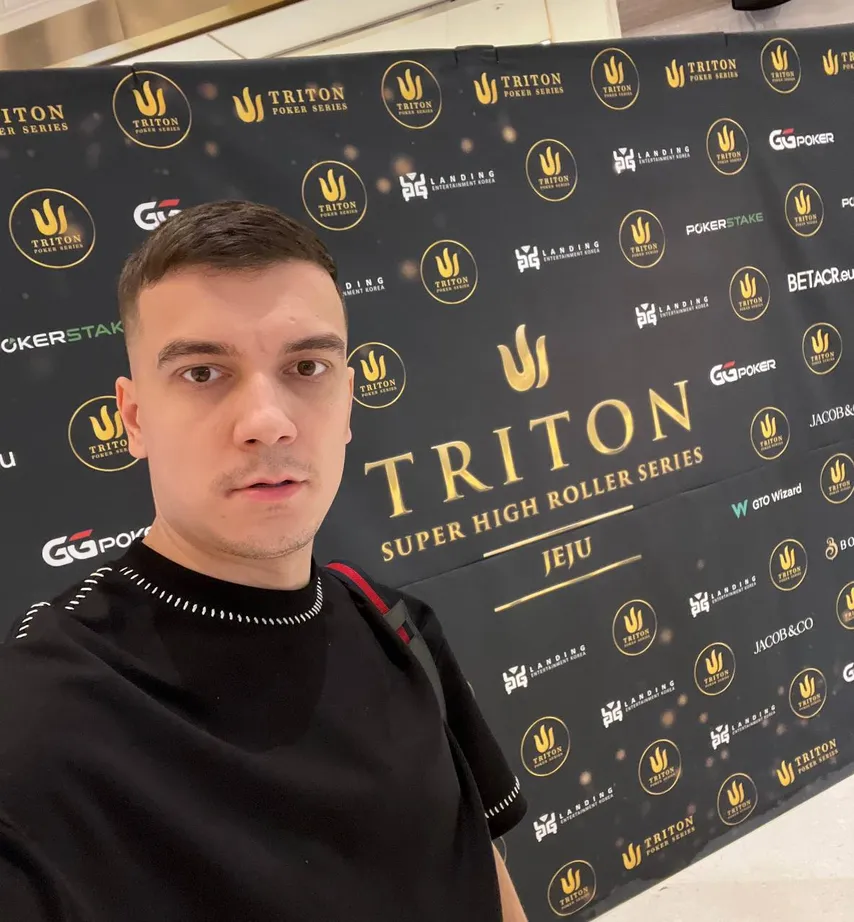
It turns out that I successfully achieved my goals – I gained invaluable experience playing in the finals, and I also managed to finish in the black. I think all my future successes will be a consequence of this debut. In general, we are gaining experience and preparing for the next breakthroughs.
By the way, I was very surprised by the level of play; it turned out that even many regulars were stuck in the past. The tournaments are played by 150-200 people, and many of them don't even have a solid game; they play once a month on Sundays, and that's it. Many are not in the best shape right now, are not fully concentrated, and do not understand the current trends in the field. And I've already played 2,000 tournaments this year, including all the most expensive ones on the Internet, such as the $10k events on GGPoker.
So, surprisingly, I felt quite comfortable on Triton. Yes, I came across strong and difficult opponents, but I also understood how to play against them.
Plus, the field was excellent, with two or three amateurs at the tables. It turns out that you don't focus on beating these tough opponents, but realize where your main expected value is and try to exploit exactly those spots that provide the main income.
If you are initially ready to show good poker, adjust correctly, and know how to maintain focus, then everything can work out for you. I arrived at Triton at the peak of my form. I decided that I was already psychologically ready and wanted to test it. Before the trip, thoughts came to me: "If not now, then when?" In general, I will continue to travel and gain experience; we will try to win tournaments and make a breakthrough.
– Do you often watch live broadcasts?
– I try to watch the most interesting ones, and I get great pleasure from the Triton broadcasts.
– Is it possible to learn something useful for your game by watching them?
– It's definitely possible. Before the trip, I was watching the latest broadcast from Triton, paying attention to the bet sizes and tells. In fact, you can prepare very well and write detailed notes for each of the regulars – what sizings they use with value hands and bluffs, timings, going beyond ranges. For example, I noticed that when Greenwood bluffs, he starts to get lost, often takes time banks, looks somewhat confused, then grabs some chips, then others. It turns out that even super experienced players can get caught sometimes. During broadcasts, all this can be noted and then used. It is clear that all situations are different, but some patterns can be found.
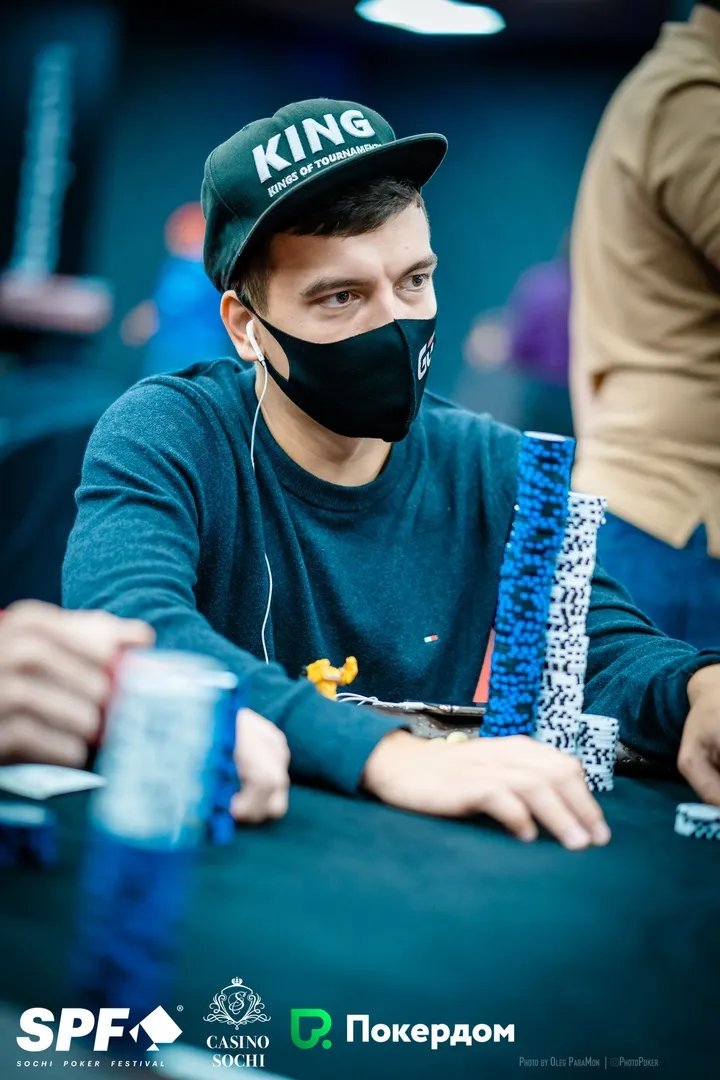
I also happened to see that Joao Vieira has a whole section in his Discord dedicated to dossiers and notes on players. You can look up some random player and there will already be 20-30 hands on them. That is, even before meeting them at the table, you can look at all this and understand what type of player is in front of you, what they are capable of, and what lines can be used against them.
I will definitely prepare for the next series and write dossiers on Triton regulars and recreational players.
– Was this your first Triton series? You wrote that you really liked it; what do you remember most?
– Yes, I previously jumped into one tournament in Cyprus, but it was just a stray bullet. The organization and atmosphere at Triton are really top-notch – you are met by a transfer at the airport, the hotel is free of charge if your total buy-ins are over $150k. Food for players is also free; you can order from the menu throughout the day, and the choice is good. There's a buffet for dinner. It turns out that apart from the buy-ins, you don't have to spend a single penny.
At the series itself, everything is also top-notch – the organization, the time banks, the chips, and the dealers. When you are just planning a trip, you are immediately added to the chat and told about all the possibilities; you can quickly find out the answer to any question. This is very valuable and pleasant. The feeling is as if you really came to the World Series of Poker or the Olympics. I'm already looking forward to the next series.
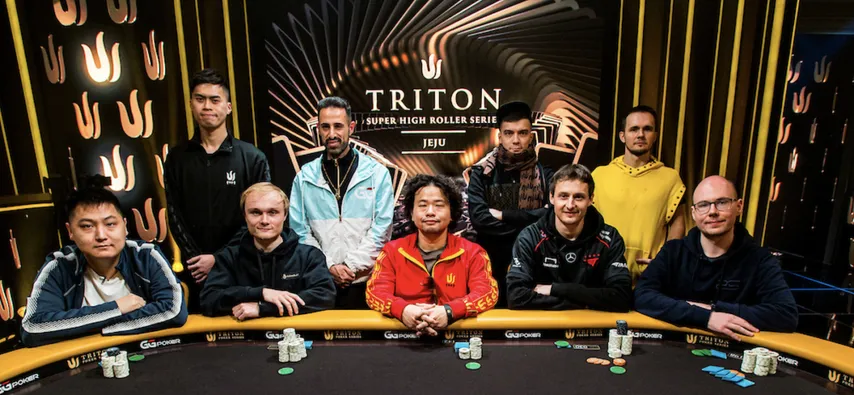
– Did you run well during the series?
– It's clear that things went very well for me at the beginning. With , I lost to but beat with . In a $20k tournament, I only lost one all-in with 5bb before the final. It's smooth sailing when you enter tournaments and you don't lose all-ins; I advise everyone to try it.
I don't even know how Rokita won that coin flip against me in the final ( vs ); it seemed that my equity in flips was not 50%, but under 85%. The rest of the tournaments were, to put it mildly, not so great.
– You talked a lot in your reports about board visualization. Can you teach readers how to do this correctly?
– I think that victories come only when you learn to let go of the situation and give up expectations. When you expose yourself and are very worried, then, in my experience, this is not a very good sign. Success comes when you become indifferent to the result. Of course, I have an idea of what kind of board I'd like to see, but overall, I don't care if I win or lose. I try to concentrate on the things I can influence – playing well and maintaining my condition. If I played well, I'll be more than satisfied with it, and how the cards were dealt doesn't depend on me. Apparently, that's why they show me the boards I need.
– During this series, you managed to pull yourself together and not tilt. Was it different before?
– There were problems of a psychological nature, perhaps due to lack of preparation. Various negative situations at the table could unsettle me; I took everything to heart, began to get upset, and tilted. I remember when I just started playing live, I flew to Prague or Sochi, entered the Main Event for $5k, got it in with queens against AK, and lost. I was so upset that I flew out the next morning. It's funny to remember now, but at the time, I was seriously angry.
Now I have worked through these moments, learned to cope with stress, suppress negative emotions, and improved my concentration. These are all the things I mean when I say "maintain composure." This concept includes 15-20 points that a professional player should have maximally developed. Without working on the mental component, the chances of achieving success in poker are close to zero. This is an important point that many people forget.
– Can you share exactly how you worked on this?
– I regularly go for consultations with a friend who works as a psychologist and with the mental coach of our KOT foundation, Oleg Rivernuts. Consultations help you find your specific flaws and psychological holes, after which you get a lot of food for thought.
There is no universal answer here – what will help me is not guaranteed to work for someone else. Thanks to consultations, you can quickly find your gaps and understand how to deal with them.
– You played pretty hard this series; what helped you not break down, and how did you recover between tournaments?
– Almost every day at Triton, I played for 12 hours. I think my grinding skills helped here; this year, I've been playing 1,000 tournaments over two months. So I was initially prepared for 12-hour gaming days, which is a standard session for me. I felt quite comfortable, definitely more so than some older or unprepared live players. Although when you look at Jean-Noël Thorel, you are immediately charged with additional motivation; if guys who are 70-80 years old are ready to play all day, then it's a shame for us young people to complain.
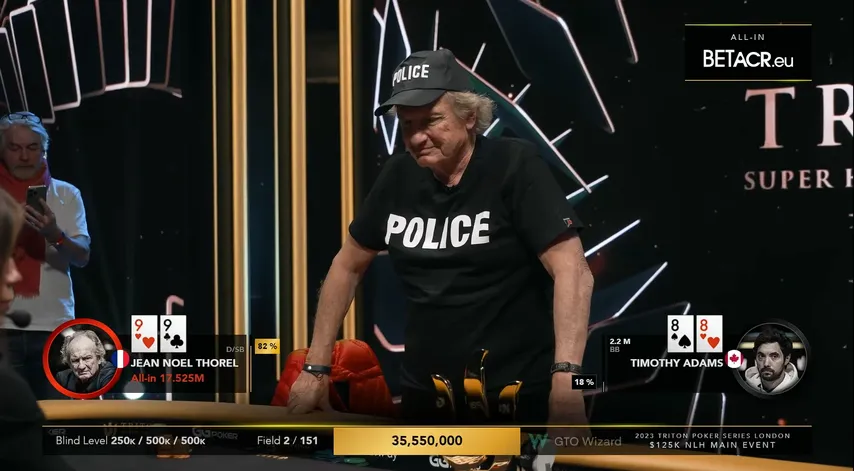
Plus, when you play Triton, you don't feel like you're doing something boring and routine. When excitement wakes up, you are no longer tired – before you know it, it's already a break. When you are as involved as possible, busy doing what you love, and enjoying the process, time flies by.
-- They say you are a very energetic person who manages to get a lot of things done. Have you always been like this or have you been working on being more productive?
-- I think I was just lucky genetically. I haven't done anything special for this, I just always strive to multitask – conduct training sessions for the team, process requests, help students, prepare for broadcasts, and also train myself, take my son to school, spend time with my family, and chat with friends. So I have a lot of different things to do all day long without stopping, and I also have to remember to play a 12-hour session myself and work on my game. This is how I always live, I never have a day when I don't have anything to do, I always try to complete a large number of tasks. For me this is the norm, I am used to living this way.
[Ed. – Alexander was multi-tasking during the interview too. We talked with him on the way to the airport, where he went to retrieve his suitcase].
– Do you have time to sleep?
– I usually sleep for 7-8 hours, and if I don't get enough sleep, I always try to take a nap for half an hour or an hour before the tournament. When you live an intensive lifestyle, sometimes your body can't take it and says, "Are you kidding me? It's time to stop and rest!" I try to listen and give myself a break. Sleeping before the tournament helps a lot; you reboot and have the strength to play the session well. If I'm not ready for a quality game, then I won't sit at the tables. I only play when I'm at my best; maybe this is part of my positive expectation. This year I've already spent so much time playing online poker, and now I've switched to live poker. All in all, it's been a good year, and it has only just begun.
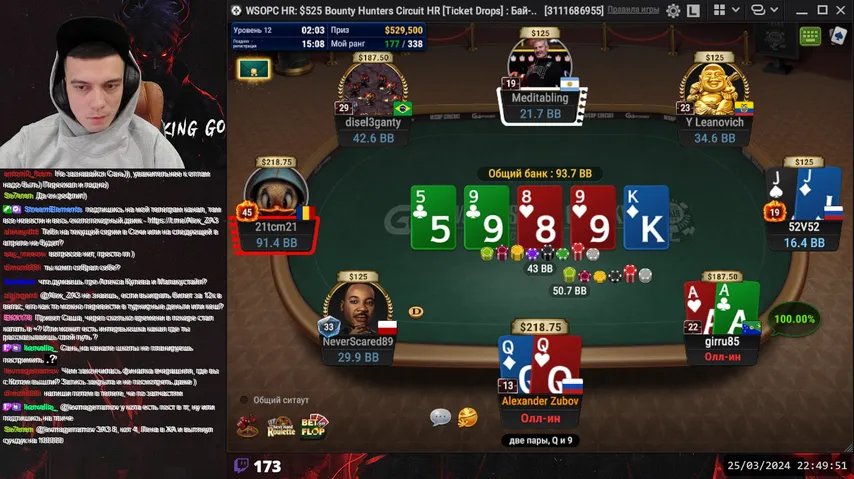
On my channel, I am running a million-dollar marathon and have already surpassed the $500k mark. If things had turned out better in the finals, I could have finished the challenge, but I have no illusions and understand perfectly well that I still need to work a lot.
– During the series, you mentioned in a message that there was a hand in which you "put your balls on the table." Can you tell me what that means?
– This happened in a tournament in which I later reached the finals. Tony Lin constantly opened from UTG without looking at his cards, putting out straddles of 2,000 or 2,500.
He was just having fun, so it was clear he could have any hand. I was in middle position and decided I couldn't fold offsuit in that situation. I 3-bet to about 9k and Tony called. The flop came something like with a flush draw. I made a continuation bet and he called. The turn was an , completing the flush. I bet 60% and he called. The river was a , and there were already about 80 big blinds in the pot.
I had a flush blocker and decided it was a great hand to bluff with. I figured I could get hands with a to fold, possibly some low ones. I thought I should get the required number of folds there. I bet 75% and got a call from . Obviously I wasn't trying to make that hand fold, but I wonder what he would have folded in that spot. Anyway, I bluffed off more than half my stack, investing about 100 big blinds in the hand. So I really "put my balls on the table!" Strategically, of course, I could have chosen another line, like checking the flop, but I played it the way I played it. I think if you've decided to tell a story, you have to see it through to the end.
After that hand I was left with 70k. In the past, in a situation like that, I would have already tilted and given away my stack. But this time I was absolutely calm and positive – I still had chips, a whole 70 big blinds, which meant I could work with it. And that's what happened, I doubled up a couple times, rebuilt my stack and eventually made my first Triton final.
– Which of your opponents gave you the most trouble at the table? Who was uncomfortable to play against?
– I felt pretty comfortable against everyone. The only one who gave me negative emotions was Christoph Vogelsang, and that was because I hadn't worked through that issue for myself. It annoyed me to no end that he constantly tanks for ages, and then slow rolls an amateur with a hand he would never fold ( on ).
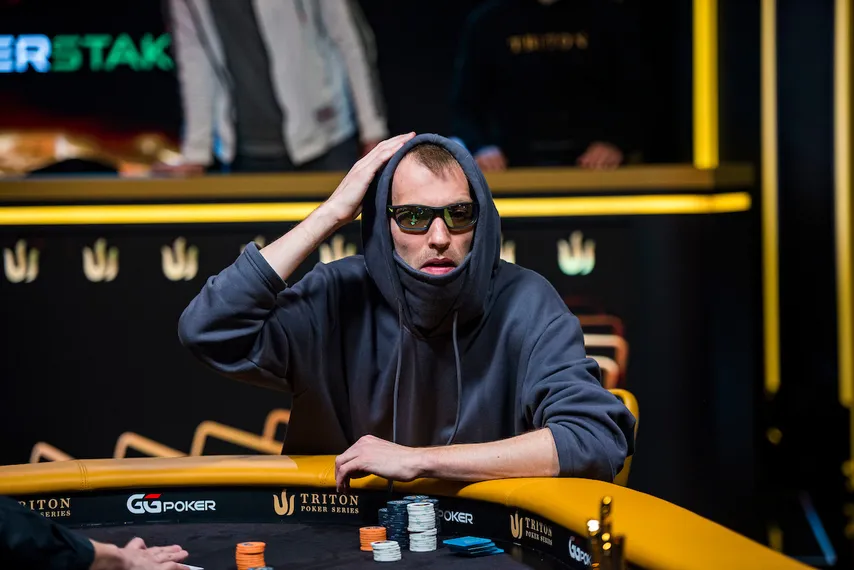
He puts on his hood and thinks for 30 seconds preflop, then folds. I was really angry about thi. Why is he doing this? If you have a hand you're going to fold, why put on the hood, sit there for 30 seconds pretending to think, and then fold? It's nonsense. But that was my mistake, I hadn't worked through moments like that and didn't know how to react to a situation that triggers and irritates me. I've rethought this now and in the future I definitely won't be thrown off balance by similar situations.
I can share a secret: I decided to consider to myself that the person is simply unwell, he has some kind of problems. He just has these peculiarities where it takes him more time to act, it happens. I programmed myself for this, after which I'll be quite comfortable and at ease playing with him in the future. Yes, he will constantly stall, but it won't affect me anymore. In general, I solved this problem for myself.
– Did you manage to find time for anything besides poker?
– We went to some nearby waterfalls, it was very beautiful and picturesque. We also visited a tea plantation, walked around, bought some local teas, and attended a tea ceremony. The rest of the time I was playing poker. I got the feeling that outside of the series there was nothing to do on this island and without Triton I definitely wouldn't have gone there.

– How did you like the players' party?
– I only stayed for about an hour and a half, then went to the airport. There were snacks, alcohol, music, and some magic tricks being performed. Overall, it was very nice. Elky wore a suit. I liked it. It's good that they organize parties like this, you can chat with the guys and spend time away from the tables, take your mind off the hands.
– Did you meet anyone interesting?
– I met Avr0ra Auroramtg for the first time here, before that I only knew him from streams, but here we talked a lot in person. I hadn't spoken with Mikita Badziakouski before either, but here we even discussed some hands. I also met Wiktor Malinowski, I was surprised that he spoke Russian well.
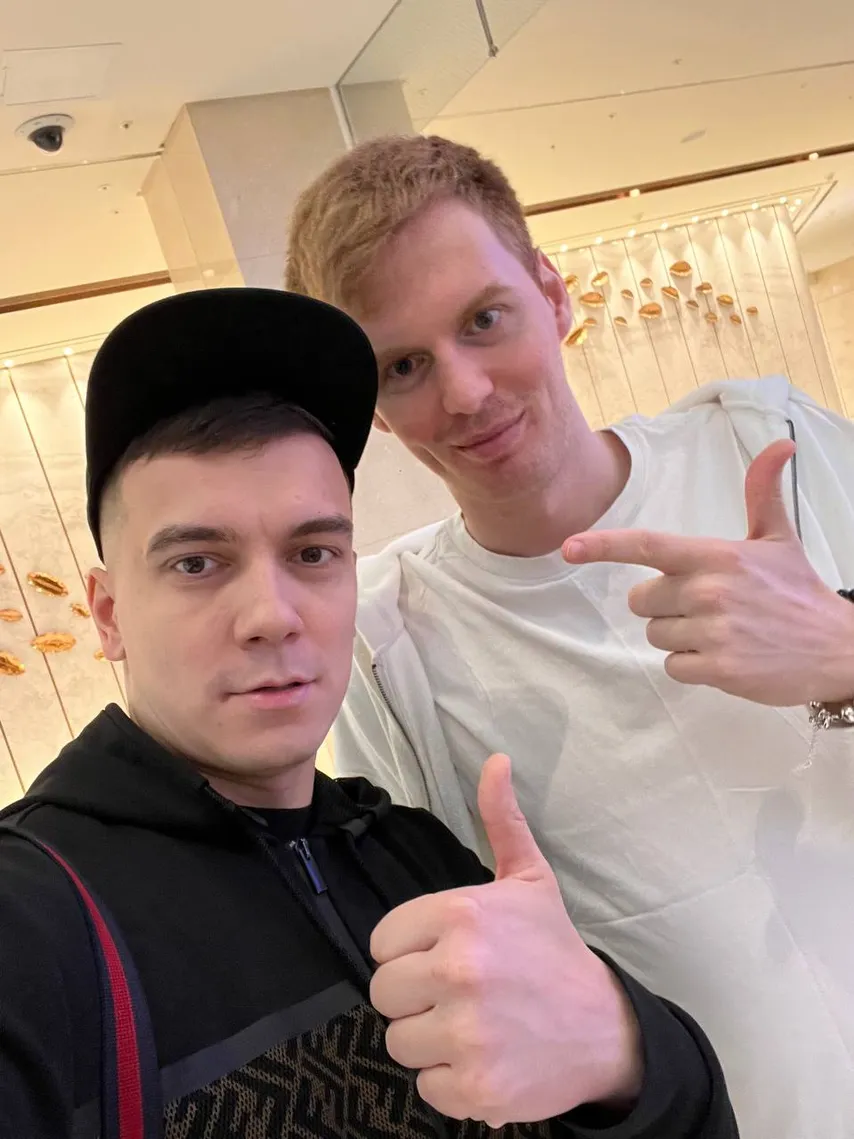
Overall, I got a lot of great impressions from the series and played with legends. I met Phil Ivey at the table for the first time – he shoved all-in on the button, and I looked down at my cards in the big blind wondering if I should call him off or not. I never could have imagined I'd be faced with decisions like that! About 10 years ago this could only have happened in my dreams.
In general, I had a lot of pleasant emotions. The atmosphere at Triton is simply unreal, there are many stars and superstars at the tables and you can communicate with everyone. This really boosts morale.
Now remembering all this, I already want to start booking tickets for the next series. I have a strong desire to break through and show good results.









